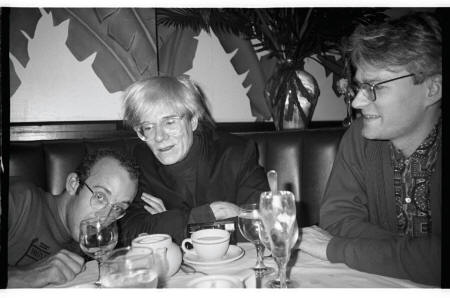

Queer Places:
Columbia University (Ivy League), 116th St and Broadway, New York, NY 10027
Syracuse University, Syracuse, NY
New York University, New York, NY
Vestal Hills Memorial Park, Vestal, Broome County, New York, USA
.jpg) Barry David Gingell, MD (December 2, 1954 – May 29, 1989)
was a Manhattan, NY, internist who was a vocal advocate of speeding up
clinical trials of experimental drugs for acquired immunodeficiency syndrome
(AIDS).
Barry David Gingell, MD (December 2, 1954 – May 29, 1989)
was a Manhattan, NY, internist who was a vocal advocate of speeding up
clinical trials of experimental drugs for acquired immunodeficiency syndrome
(AIDS).
Dr Gingell earned a bachelor of science degree from Syracuse (NY) University and a medical degree from New York University School of Medicine in 1980. He interned at Bellevue Hospital, New York, then practiced medicine on the Lower East Side of Manhattan at the NENA Health Care Center and in the Bronx, NY, at St Barnabas Hospital. He was working on a degree in computer science at Columbia University, New York City, when he died.
Dr Gingell combined his medical interests and computer training by founding Optimal Nutrition Engineering, a computerized nutritional advisory program that he directed for 5 years.
In July 1987, Dr Gingell became the medical information director of the Gay Men's Health Crisis, an organization devot o educating the public and combating the disease. There, he served as the editor of two publications: Treatment Issues, a newsletter discussing experimental treatments for AIDS that had a circulation of 7000 to 8000, and AIDS Clinical Update, a compilation of current scholarship on the disease.
Dr Gingell was frustrated with what he perceived to be the slow pace of research into therapies to combat AIDS as well as the Food and Drug Administration's rigid standards for the authorization of testing of certain drugs. In an interview 15 months ago he expressed his concerns, stating that "right now at least 10 to 20 drugs show promising results elsewhere in the world or in the laboratory, but many potential therapies aren't being tested" (New York Times, May 29, 1989:B6). One example Dr Gingell often pointed to was the restrictions placed on the drug trimetrexate, an experimental drug used in treating Pneumocystis carinii pneumonia.

Keith Haring, Andy Warhol and Barry Gingell
Dr Gingell was a member of many
advisory boards that analyzed the problem of AIDS, including those organized
by such groups as the National Academy of Sciences, the Society of Infectious
Diseases, the AIDS Resource Center, the Community Research Initiative, and New
York Physicians for Human Rights. Testifying before Congress, the Presidential
Commission on the HIV epidemic, and panels of the Food and Drug
Administration, he strongly expressed his concerns with the slowness of AIDS
research. He also reviewed materials for the National Academy of Science's
1988 report "Confronting AIDS."
Dr Gingell was diagnosed with the
disease in 1985 ago and was one of the first patients with AIDS in America to
travel to Mexico to obtain ribavirin. He spent the last 3 months of his life
in the hospital. He died of AIDS May 28, 1989, at St Vincent's Hospital, New
York, NY. He was 34 years old.
My published books: